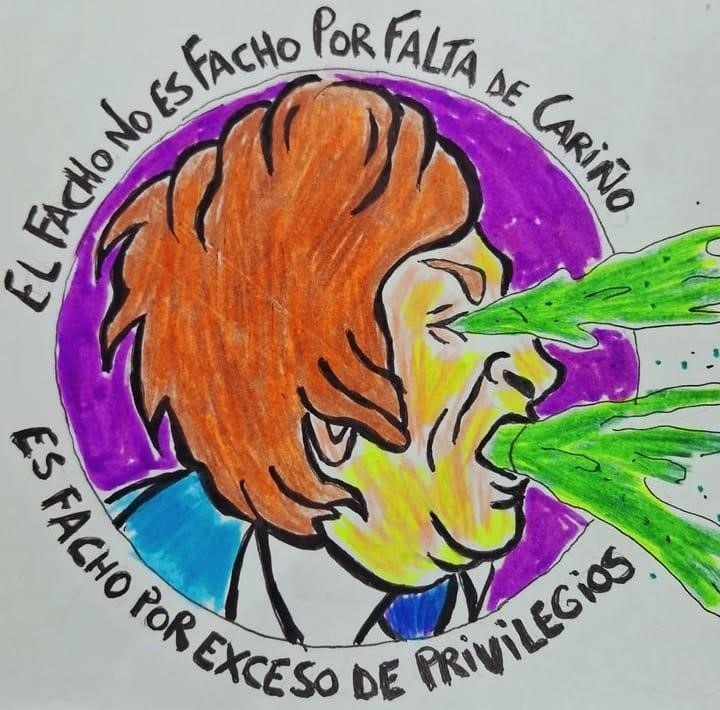Hate speech is not innocent. On May 5, 2024, a man entered a hotel room in Barracas, Argentina, where two lesbian couples lived and set it on fire. Andrea Amarante, Pamela Cobbas and Roxana Figueroa were killed in the fire. Sofia Castro Riglos is the only survivor.
In Argentina, between January 1 and July 31, 2024, there were 140 femicides recorded. Javier Milei’s ascent to president marked a break from the state’s institutionalization of a gender perspective that, while still predominantly binary, had legitimacy in society. Today, the rates of anti-trans killings, femicide, lesbicide, and street violence against the LGBTQNB+ community have increased. This is not coincidental but a direct consequence of the increasing amount of hate speech propagated by the state.
Naturalization of Hate Speech
Hate speech consists of social narratives that circulate and are reproduced, primarily in public spaces, whether in the media, social networks, or on the internet, and that convey prejudices and negative stereotypes about a particular group or collective of people, with the aim of justifying, legitimizing, and inciting confrontation and/or social violence from one sector of society against another.
Javier Milei puts forth a culturally reactionary discourse: he advocates for the traditional heterosexual family and religious values, positions himself against ‘gender ideology,’ opposes abortion (even in cases of sexual abuse), and denies the existence of gender-based violence and unequal wage gaps.
Today, eight months after Milei’s inauguration, the consequences for society as a whole, and especially for the queer community, are dire. In just a few months of governing, he dismantled decades of feminist and gender policies in Argentina. He closed the Ministry of Gender and Diversity, the Subsecretariat for Gender Violence, the INADI (National Institute Against Discrimination, Xenophobia, and Racism), and defunded all support programs for cis women and queer people. In the area of public health, the availability of misoprostol (a medication used in abortions) and contraceptives has decreased as the national state stopped supplying the necessary materials.
All these deregulations have been accompanied by the elimination of the gender perspective from the public administration. Currently, the use of inclusive language is prohibited, as well as ‘the unnecessary inclusion of the feminine in all documents,’ as detailed by presidential spokesperson Manuel Adorni in February 2024. It is in this context that the Argentinian justice system refused to consider the triple lesbian femicide as a hate crime.
Criminalizing Protest
At the same time, demonstrations have been outlawed. Since December 2023, the implementation of a protocol banning picketing has resulted in an increase of resources allocated to police operations, the indiscriminate use of so-called ‘less lethal weapons’ such as rubber bullets, irritant gases and sticks and an escalation of repression and public threats against organizations and individuals who protest in public spaces.
In a climate of widespread layoffs, job insecurity and instability, the state has dealt with those exercising their right to take to the streets by employing violence and arbitrary arrests. The police no longer distinguish between retirees, children or press workers – all individuals receive the same treatment.
For the queer community, social protest has historically been the way to vindicate our existence and to stand up to transfemicide and discriminatory dismissals, as well as other measures that oppress us. Today more than ever civil disobedience has to be our flag.
Closing Thoughts
Hate speech reproduced and legitimized by the state has clear consequences in the lives of queer people. The application of a gender perspective, along with the existence of programs and social policies aimed at protecting the rights of cis women and queer individuals, cannot be isolated initiatives or decisions made by the current government. Rather, they must be a mandatory responsibility of the national state, carried out, evaluated, and supervised by professionals in the field of social sciences with a non-binary stance on gender and verified experience in the subject matter.
Globally, Argentina stands out as a country with a substantial body of legislation that incorporates a gender perspective: Gender Identity Law, Equal Marriage Law, the inclusion of femicide in the Penal Code, Sexual Education Law, the first ruling related to the transfemicide of Diana Sacayán, legalization of abortion, and Law for the Promotion of Access to Formal Employment for trans people are among the most important pieces of legislation.
Since 2015, the presence of historical-political phenomena like “Ni Una Menos” have had a clear social and cultural impact, enabling improvements in the economic and social reality of the LGBTQNB+ community, as well as the progressive transformation of cultural imagery. At the latest Ni Una Menos demonstration, the outrage over the triple lesbicide and the demand for reparations for Sofia led the march. In the context of a clear increase in gender-based violence, we cannot allow for any step backward.
Title image: “The facist is not facist for lack of affection, [he] is facist for excess of privileges”. Illustrated by @fisionciruja. Tenshi is a non-binary author and cartoonist. Some of their most recent publications are Les violentes (2022) edited by Expandiendo la Revuelta; Fábulas antihumanas (2023), edited by La Técnica Quiltra and Cirujxs, planerxs, mutantxs (2023), edited by Lumpen Editorial.
Carolina Rossi has a degree in Sociology from the University of Buenos Aires and is a Master’s Candidate in Social Science Research (FSOC-UBA). Currently she is a research intern in the project ‘Queer Reading – a Methodology, German Literature in the Age of Paragraph 175’ at the Research Centre for the Cultural History of Sexuality at Humboldt-Universität zu Berlin. She researches the role of transfeminist agency in the possibilities of breaking with gender violence experienced by the LGBTIQNB+ collective in family, educational and work spaces. From an intersectional and transfeminist approach, she focuses on reconstructing the life trajectories of queer people. She analyzes the impacts of violence experienced on the basis of gender and social class on the possibilities of finishing high school and university studies, entering a stable labor market, maintaining jobs and advancing within employment.

